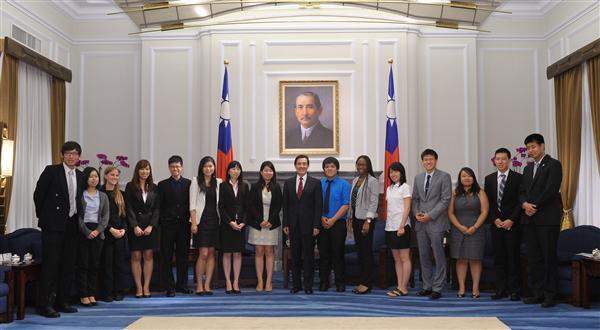News & activities
 News releases
News releases
2012-08-29
President Ma meets delegation that attended the Harvard Project for Asian and International Relations 2012 Asia Conference
President Ma Ying-jeou met on the morning of August 29 with a delegation of persons who had attended the Harvard Project for Asian and International Relations (HPAIR) 2012 Asia Conference, hosted by National Chengchi University in Taipei. During the meeting, the president reiterated his hopes that cross-strait relations will continue to develop in a peaceful manner, which will foster a win-win-win situation for the two sides of the Taiwan Strait and the international community.
In remarks, the president stated that in 1992, as an alumnus of Harvard, he had attended the first Asia Conference of the HPAIR, which was held in Taipei. That conference focused on uncertainties in the post-Cold War era, and generated intense interest. The experience of being involved in the planning of such an event and taking part in the discussions can broaden a young person's horizons and foster the development of a proper world view.
The president mentioned that Taiwan entered the World Trade Organization 10 years ago. Twenty years ago, the two sides of the Taiwan Strait were able to establish a pre-condition for interaction—the "1992 Consensus"—whereby each side acknowledged the existence of "one China" but agreed to maintain its own interpretation of what that means. Thirty years ago, he said, the United States signed the third of its three communiqués with mainland China (i.e. the "August 17 Communiqué"), and at the same time provided "the Six Assurances" to Taiwan to pledge its commitment to our nation's security. All of these events were milestones in Taiwan's history, the president said.
Turning to the subject of cross-strait relations, President Ma reiterated that the government, working within the framework of the ROC Constitution, will maintain the status quo in the Taiwan Strait of "no unification, no independence, and no use of force," and will seek peaceful cross-strait relations on the foundation of the "1992 Consensus," whereby each side acknowledges the existence of "one China" but maintains its own interpretation of what that means. Within that context, he said, we will address "easy issues before difficult ones," "urgent matters before non-urgent ones," and "economic matters before political ones."
President Ma stated that at present Taiwan and mainland China have already signed 18 agreements, including the Cross-Straits Economic Cooperation Framework Agreement and, more recently, the Cross-Strait Bilateral Investment Protection and Promotion Agreement and the Cross-Strait Customs Cooperation Agreement. The president added that Taiwan's relations with the United States, Japan, the European Union, and other countries have also advanced in the wake of the improvement in the cross-strait relationship. President Ma also expressed his desire that the two sides of the Taiwan Strait will continue to engage in dialogue in order to create a win-win-win situation for both sides and the international community.
The delegation was led by National Chengchi University's College of International Affairs Dean Teng Chung-chian (鄧中堅), and was escorted to the Presidential Office by Vice Minister of Foreign Affairs Simon Shen-Yeaw Ko (柯森耀) and Deputy Education Minister Chen Der-hwa (陳德華) to meet President Ma. Also attending the meeting was National Security Council Advisor Francis Yi-Hua Kan (甘逸驊).
In remarks, the president stated that in 1992, as an alumnus of Harvard, he had attended the first Asia Conference of the HPAIR, which was held in Taipei. That conference focused on uncertainties in the post-Cold War era, and generated intense interest. The experience of being involved in the planning of such an event and taking part in the discussions can broaden a young person's horizons and foster the development of a proper world view.
The president mentioned that Taiwan entered the World Trade Organization 10 years ago. Twenty years ago, the two sides of the Taiwan Strait were able to establish a pre-condition for interaction—the "1992 Consensus"—whereby each side acknowledged the existence of "one China" but agreed to maintain its own interpretation of what that means. Thirty years ago, he said, the United States signed the third of its three communiqués with mainland China (i.e. the "August 17 Communiqué"), and at the same time provided "the Six Assurances" to Taiwan to pledge its commitment to our nation's security. All of these events were milestones in Taiwan's history, the president said.
Turning to the subject of cross-strait relations, President Ma reiterated that the government, working within the framework of the ROC Constitution, will maintain the status quo in the Taiwan Strait of "no unification, no independence, and no use of force," and will seek peaceful cross-strait relations on the foundation of the "1992 Consensus," whereby each side acknowledges the existence of "one China" but maintains its own interpretation of what that means. Within that context, he said, we will address "easy issues before difficult ones," "urgent matters before non-urgent ones," and "economic matters before political ones."
President Ma stated that at present Taiwan and mainland China have already signed 18 agreements, including the Cross-Straits Economic Cooperation Framework Agreement and, more recently, the Cross-Strait Bilateral Investment Protection and Promotion Agreement and the Cross-Strait Customs Cooperation Agreement. The president added that Taiwan's relations with the United States, Japan, the European Union, and other countries have also advanced in the wake of the improvement in the cross-strait relationship. President Ma also expressed his desire that the two sides of the Taiwan Strait will continue to engage in dialogue in order to create a win-win-win situation for both sides and the international community.
The delegation was led by National Chengchi University's College of International Affairs Dean Teng Chung-chian (鄧中堅), and was escorted to the Presidential Office by Vice Minister of Foreign Affairs Simon Shen-Yeaw Ko (柯森耀) and Deputy Education Minister Chen Der-hwa (陳德華) to meet President Ma. Also attending the meeting was National Security Council Advisor Francis Yi-Hua Kan (甘逸驊).



